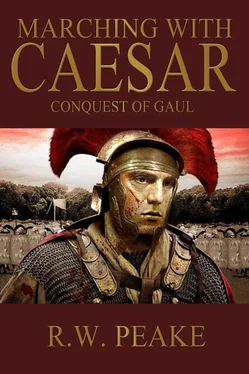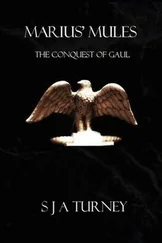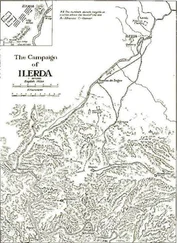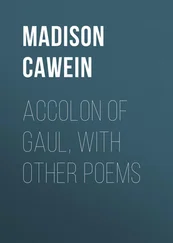R. Peake - Marching With Caesar - Conquest of Gaul
Здесь есть возможность читать онлайн «R. Peake - Marching With Caesar - Conquest of Gaul» весь текст электронной книги совершенно бесплатно (целиком полную версию без сокращений). В некоторых случаях можно слушать аудио, скачать через торрент в формате fb2 и присутствует краткое содержание. Жанр: Исторические приключения, на английском языке. Описание произведения, (предисловие) а так же отзывы посетителей доступны на портале библиотеки ЛибКат.
- Название:Marching With Caesar: Conquest of Gaul
- Автор:
- Жанр:
- Год:неизвестен
- ISBN:нет данных
- Рейтинг книги:3 / 5. Голосов: 1
-
Избранное:Добавить в избранное
- Отзывы:
-
Ваша оценка:
- 60
- 1
- 2
- 3
- 4
- 5
Marching With Caesar: Conquest of Gaul: краткое содержание, описание и аннотация
Предлагаем к чтению аннотацию, описание, краткое содержание или предисловие (зависит от того, что написал сам автор книги «Marching With Caesar: Conquest of Gaul»). Если вы не нашли необходимую информацию о книге — напишите в комментариях, мы постараемся отыскать её.
Marching With Caesar: Conquest of Gaul — читать онлайн бесплатно полную книгу (весь текст) целиком
Ниже представлен текст книги, разбитый по страницам. Система сохранения места последней прочитанной страницы, позволяет с удобством читать онлайн бесплатно книгу «Marching With Caesar: Conquest of Gaul», без необходимости каждый раз заново искать на чём Вы остановились. Поставьте закладку, и сможете в любой момент перейти на страницу, на которой закончили чтение.
Интервал:
Закладка:
Once more we found ourselves staying in one place for a couple of days when it was the turn of the other Legions to nurse their wounds and regroup. Even so, we were being sent out in Century and Cohort-sized patrols while they rested, ranging the countryside looking for both Lusitani and anything worth eating or destroying. Late in the day of our second day in place, our Century and the Second Century was finishing the burning of a farm and surrounding buildings when we were attacked by a mixed force of mounted warriors and infantry. It was only because of the Pilus Prior that, despite being surprised, we were not unprepared, since he had drilled us over and over for just such an eventuality. There is no way to overstate the value of the type of drill that the Roman army does, because it prepares us for just such emergencies, making our reactions as close to second nature as I believe it is possible to get. In this case, the enemy waited until we were finished torching the farm, so that some of the men were occupied with driving the half-dozen cattle while others were carrying freshly killed chickens. Perhaps a third of one Century was thus occupied, while a section scouted ahead on foot and another section acted as rearguard. Caesar’s army during this campaign was hampered by a lack of cavalry and it was because of this deficiency that a body of men more than three times the size of our two Centuries could get close enough to try and ambush us. They waited until we were passing through a heavily wooded section, which the Pilus Prior had pointed out to us as a good spot for an ambush as we passed through, something I believe was a factor in our quick reaction as well. Despite this, it was not enough to save some of us, with the attack signaled by a volley of spears that flew out from either side, a half-dozen of them finding their mark among us. The hissing sounds were instantly followed by thuds as they struck the bodies of our comrades, two or three of them screaming in pain as they were impaled, but the others perhaps were luckier, falling immediately without a sound and I caught a glimpse of a man in the front of the formation transfixed through the chest, his eyes staring vacantly at the sky, his spirit already having fled before he hit the ground.
“Form square!”
The Pilus Prior roared this command and we instantly obeyed, even as the Lusitani descended on us from the surrounding woods, their war cries suffused with joy that they had already struck some of us down. Because of the surprise, we had no time to form in our normal manner, with each section arranged in its usual line of march side by side, so I found myself for a change in the middle of the line instead of on the end, and at the rear of the formation which was not exposed to immediate attack, though soon enough the warriors flowed like water around us on all sides. Risking a quick glance, I saw that once again Vibius was by my side, this time to my right, with a man named Plautius from the third section on my left. That was all the time I had because the Lusitani came throwing themselves at us, using their bodies as just as much of a weapon as any of their spears or swords. They had learned that their best chance to defeat us was to break our formation, and one thing I cannot take away from them is their bravery. There never seemed to be a limit to the number of men willing to sacrifice themselves on our wall so that their comrades would have a space in which to strike at us. Again the continuous drill proved priceless,g when the Lusitani managed to knock a man down a short distance away from me, whereupon he was immediately hacked to death by the howling mob. This was their mistake, because during the time they turned their attention onto the unfortunate Legionary, it gave the man behind him the opportunity to step into his spot. One of our many problems was that we only had a double line, formed in a square twenty-odd men across and two deep, and even in the second line there were a couple of empty spots. It was when we were arrayed in this manner that it was brought home to me that we had lost men in battle already, and any more that we lost would make us that much weaker. Perhaps one of the most difficult things about fighting in square, at least as far as I was concerned, is that you are quickly surrounded and despite the fact you are facing your part of the enemy, you are still constantly aware that there is fighting going on behind you and to the sides, outside of your peripheral vision. Simply put, if there is a breakthrough in those parts, you are very likely to be slaughtered. But one has to have faith in one’s fellow Legionaries, just like they have to have faith in you, and for me at least it was this knowledge that drove me in striving never to be the one who subjected my comrades to death. This group of Lusitani, while brave, was not particularly skilled and dressed in a slightly different fashion than what we faced before, a sign that they were from another branch. In quick succession, I dispatched three men facing me, so that it was only a matter of moments before the Lusitani who kept coming had to slow down to scramble over the bodies of their fallen, something that worked to our advantage. My arm began to grow weary, but this is where our training serves us best, because there is no waste motion; unlike our opponents there is no flailing about, screaming and gnashing of teeth, all of which consume energy. That is why the nature of battle is a series of ebbs and flows; at the beginning it is all sound and fury, with each side doing its best to kill each other. Inevitably, the energy levels fall, and then both sides will spend a few moments doing little more than stand several feet apart, glare and curse at each other before recovering enough to do it again. However, the only time that the fury of battle is equal to the opening clash is when one side or another begins to smell that the end is near, with one great effort tipping the scale in their favor. It is during this period where the conditioning of the Roman Legionary is most evident; we are generally the ones with the reserves of energy left to make that final push and finish off our enemy.
This day, the battle unfolded in a similar manner. Once we sustained the initial assault the Lusitani settled into their usual series of rushes of small groups of men, trying first one side of the square then the other, which were easily repulsed. In fact, it seemed to be much easier than it should have been, and it was Calienus who first brought it to our attention.
“Something’s not right,” he muttered from his place in the second rank.
Calienus turned to the Pilus Prior, commanding from a spot in the middle of the square. Lying at his feet were four men who had been wounded thus far, one of them looking as if he would not last the day, which he did not.
“Pilus Prior,” he called out.
“What is it Calienus?”
“Does this seem right to you? I mean, do these bastards seem like they're just trying to hold us in place more than they're trying to kill every one of us?”
The Pilus Prior looked around, taking in each side of the square, his eyes narrowed in thought. Nodding his head, he replied, “You’re right. They’re trying to keep us pinned here while they wait. I don’t know what they’re waiting for, but I don’t want to find out.”
Then he leaned down to examine the wounded men, speaking softly so that what he said could not be heard over the din. One of the men shook his head, while the others grimaced as they pulled themselves to their feet. Turning my attention back to the front, I saw that it was my turn to step forward while Romulus, who had originally been directly behind me, pushed the Lusitani away before stepping to the side so that I could take his place.
“Right," the Pilus Prior's voice rang out clearly above the din, "we’re not going to wait around for whatever these bastards have planned for us, so everyone stand ready. When I give the command, we’re going to march out of these woods and try to find some better ground.”
Читать дальшеИнтервал:
Закладка:
Похожие книги на «Marching With Caesar: Conquest of Gaul»
Представляем Вашему вниманию похожие книги на «Marching With Caesar: Conquest of Gaul» списком для выбора. Мы отобрали схожую по названию и смыслу литературу в надежде предоставить читателям больше вариантов отыскать новые, интересные, ещё непрочитанные произведения.
Обсуждение, отзывы о книге «Marching With Caesar: Conquest of Gaul» и просто собственные мнения читателей. Оставьте ваши комментарии, напишите, что Вы думаете о произведении, его смысле или главных героях. Укажите что конкретно понравилось, а что нет, и почему Вы так считаете.












